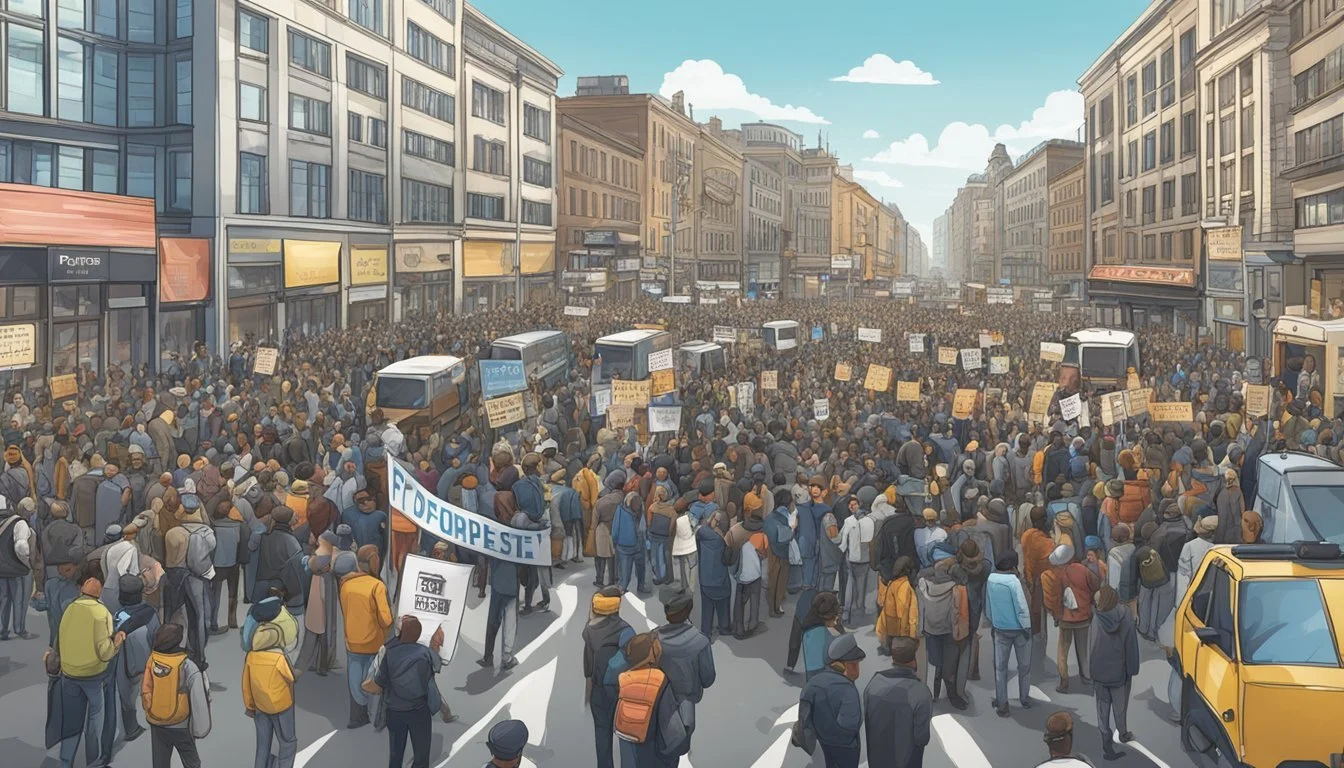MLK's Last Days: 8 Films on the Assassination of a Civil Rights Icon
A Cinematic Journey Through History
Martin Luther King Jr.'s assassination on April 4, 1968, marked a pivotal moment in American history. The tragic event not only ended the life of a influential civil rights leader but also sparked widespread unrest and mourning across the nation. In the decades since, filmmakers have sought to capture the significance of King's final days and the impact of his death.
Several films explore the circumstances surrounding King's assassination and its aftermath, offering viewers insight into this crucial period. These movies range from dramatizations to documentaries, each presenting a unique perspective on the events leading up to and following the fateful day in Memphis. By examining these films, audiences can gain a deeper understanding of King's legacy and the ongoing struggle for civil rights in America.
1) Selma (2014)
Selma portrays a pivotal moment in the civil rights movement led by Dr. Martin Luther King Jr. The film focuses on the 1965 voting rights marches from Selma to Montgomery, Alabama.
Directed by Ava DuVernay, Selma features David Oyelowo in a powerful performance as Dr. King. The movie depicts the strategic planning and intense struggles faced by activists in their quest for equal voting rights.
The film showcases the brutal opposition encountered by peaceful protesters, including the violent confrontation on "Bloody Sunday" at Edmund Pettus Bridge. It also highlights the complex political negotiations between Dr. King and President Lyndon B. Johnson.
Selma earned critical acclaim for its historical accuracy and emotional impact. The movie received numerous awards and nominations, including an Academy Award for Best Original Song.
While not directly addressing King's assassination, Selma provides crucial context for understanding the civil rights movement's challenges and King's leadership in the years leading up to his death.
https://en.wikipedia.org/wiki/Selma_(film)
2) King in the Wilderness (2018)
King in the Wilderness focuses on the final years of Martin Luther King Jr.'s life, from 1965 to 1968. This HBO documentary offers a unique perspective on the civil rights leader during a tumultuous period.
The film explores King's internal struggles and external challenges as he faced criticism from various sides. It portrays his complex journey, highlighting the conflicts he encountered within the movement and society at large.
Directed by Peter W. Kunhardt, the documentary features interviews with King's close associates and confidants. These firsthand accounts provide intimate insights into King's personal experiences and mindset during his last years.
King in the Wilderness paints a nuanced picture of a man grappling with doubts and difficulties while maintaining his commitment to nonviolent activism. The film sheds light on lesser-known aspects of King's final chapter, offering viewers a deeper understanding of his legacy.
https://en.wikipedia.org/wiki/King_in_the_Wilderness
3) I Am MLK Jr. (2018)
"I Am MLK Jr." is a documentary that explores the life and impact of Dr. Martin Luther King Jr. The film, directed by John Barbisan and Michael Hamilton, offers a comprehensive look at King's role in the civil rights movement.
The documentary features interviews with notable figures such as Jesse Jackson, Carmelo Anthony, and Nick Cannon. It examines key events in King's life and the broader civil rights struggle.
"I Am MLK Jr." covers significant moments like the Montgomery Bus Boycott, the Birmingham Campaign, and the March on Washington. These events are presented to illustrate King's leadership and the movement's progress.
The film also addresses King's assassination and his enduring legacy. It connects his work to contemporary social justice issues, demonstrating the continued relevance of his message.
At 96 minutes long, the documentary provides an accessible introduction to King's life for viewers unfamiliar with his story. It also offers new perspectives for those already knowledgeable about the civil rights era.
https://www.imdb.com/title/tt8080204/
4) The Witness: From the Balcony of Room 306 (2008)
This documentary short film offers a unique perspective on Martin Luther King Jr.'s final moments. Directed by Adam Pertofsky, it centers on the recollections of Reverend Samuel "Billy" Kyles.
Kyles stood beside Dr. King on the balcony of the Lorraine Motel in Memphis, Tennessee, on April 4, 1968. He witnessed King's assassination firsthand, providing a deeply personal account of the tragedy.
The film features interviews with civil rights leaders like Maxine Smith and Dr. Benjamin Hooks. Their testimonies add depth to the narrative, contextualizing King's impact on the civil rights movement.
"The Witness" was nominated for Best Documentary Short at the 2008 Academy Awards. It stands out among Martin Luther King Jr. documentaries for its intimate portrayal of the iconic leader's last day.
Through Kyles' storytelling, viewers gain insight into the moments leading up to and following the assassination. The film serves as a poignant reminder of Dr. King's legacy and his enduring influence on American society.
https://en.wikipedia.org/wiki/The_Witness:_From_the_Balcony_of_Room_306
5) MLK/FBI (2020)
MLK/FBI is a compelling documentary directed by Sam Pollard that explores the U.S. government's surveillance of Martin Luther King Jr. The film draws from newly declassified files to reveal the extent of the FBI's efforts to discredit and harass the civil rights leader.
The documentary provides a sobering look at the American intelligence community's campaign against King. It examines how the FBI, under J. Edgar Hoover's direction, intensively monitored King's activities and personal life.
MLK/FBI received critical acclaim for its incisive examination of this dark chapter in American history. The film holds a 99% approval rating on Rotten Tomatoes, with critics praising its thought-provoking content and historical significance.
The documentary doesn't shy away from addressing the complexity of King's legacy. It explores how the FBI's invasion of King's privacy uncovered aspects of his personal life that have since become subjects of debate.
MLK/FBI also delves into how Hollywood portrayals of both Black men and the FBI influenced public perceptions of King and the bureau's actions against him. This contextual analysis adds depth to the film's examination of this historical period.
6) Roads to Memphis (2010)
"Roads to Memphis" is a documentary that explores the parallel paths of Dr. Martin Luther King Jr. and his assassin, James Earl Ray. The film delves into the events leading up to King's assassination in Memphis on April 4, 1968.
Directed by Stephen Ives, the documentary provides a detailed account of Ray's life and motivations. It examines his background, criminal history, and the circumstances that brought him to Memphis on that fateful day.
The film also focuses on Dr. King's final days and his work with the sanitation workers' strike in Memphis. It highlights the mounting pressures King faced and the increasingly dangerous environment surrounding his activism.
Through interviews, archival footage, and expert analysis, "Roads to Memphis" offers a comprehensive look at the social and political climate of 1968. The documentary explores the tensions and turmoil that characterized the era.
"Roads to Memphis" presents a balanced and insightful examination of one of the most significant events in American civil rights history. It sheds light on the complexities of both King's life and the mind of his assassin.
7) King: A Filmed Record... Montgomery to Memphis (1970)
"King: A Filmed Record... Montgomery to Memphis" is a landmark documentary that chronicles Martin Luther King Jr.'s life and civil rights activism. Released in 1970, the film provides a comprehensive look at King's journey from the Montgomery bus boycott to his assassination in Memphis.
The documentary features rare footage of King's speeches, protests, and behind-the-scenes moments. It captures the essence of the civil rights movement and King's pivotal role in shaping American history.
Directed by Sidney Lumet and Joseph L. Mankiewicz, the film includes narration by prominent actors such as Harry Belafonte, Ruby Dee, and Paul Newman. Their contributions add depth to the historical footage and King's powerful oratory.
"King: A Filmed Record" serves as both a tribute to King's legacy and a historical record of the civil rights era. It offers viewers an intimate look at the challenges faced by African Americans and the nonviolent strategies employed to combat racial injustice.
The film's chronological structure allows audiences to witness King's growth as a leader and the evolution of the civil rights movement. It stands as a vital educational resource and a testament to King's enduring impact on American society.
https://en.wikipedia.org/wiki/King:_A_Filmed_Record..._Montgomery_to_Memphis
8) The Autobiography of Martin Luther King Jr. (1999)
This posthumously published book offers a unique perspective on Dr. King's life and legacy. Compiled from King's writings, speeches, and interviews, it provides an intimate look into his thoughts and experiences.
The autobiography covers key moments in King's journey, from his childhood in segregated Atlanta to his leadership in the Civil Rights Movement. It explores his philosophy of nonviolent resistance and his vision for racial equality.
Readers gain insight into King's personal struggles and triumphs. The book delves into his role in major events like the Montgomery Bus Boycott and the March on Washington.
King's eloquent prose shines throughout the text, showcasing his powerful oratory skills. His words continue to inspire and challenge readers decades after his death.
While not a film, this book serves as a valuable resource for understanding King's life and legacy. It complements visual media by providing direct access to King's thoughts and reflections.
Historical Context
The assassination of Martin Luther King Jr. occurred during a pivotal period in American history. The 1960s were marked by significant social and political upheaval, with the Civil Rights Movement at its peak.
Civil Rights Movement
The Civil Rights Movement gained momentum in the 1950s and 1960s. African Americans and their allies fought against racial segregation and discrimination through nonviolent protests, boycotts, and legal action.
Key events included the Montgomery Bus Boycott, the March on Washington, and the passage of landmark legislation like the Civil Rights Act of 1964 and the Voting Rights Act of 1965.
These efforts faced fierce opposition from segregationists and law enforcement agencies. Violence against civil rights activists was common, including bombings, beatings, and assassinations.
MLK's Leadership and Legacy
Martin Luther King Jr. emerged as a prominent leader of the Civil Rights Movement in the mid-1950s. His philosophy of nonviolent resistance inspired millions and helped shape the movement's tactics.
King's powerful speeches, including "I Have a Dream," galvanized supporters and brought national attention to civil rights issues. He received the Nobel Peace Prize in 1964 for his efforts.
In his later years, King expanded his focus to include economic inequality and opposition to the Vietnam War. This broader agenda drew criticism from some allies and increased government surveillance of his activities.
King's assassination on April 4, 1968, shocked the nation and sparked widespread unrest. His death marked a turning point in the Civil Rights Movement and American history.
Impact of MLK's Assassination
The assassination of Martin Luther King Jr. on April 4, 1968 sent shockwaves across America. It sparked immediate unrest and profoundly shaped the trajectory of the civil rights movement and race relations for decades to come.
National Reaction
Riots erupted in over 100 cities following King's death. Washington D.C. saw some of the worst violence, with buildings set ablaze and thousands arrested. President Johnson deployed federal troops to restore order.
Many African Americans felt deep anger and despair at the loss of their leader. Some embraced more militant approaches to achieving racial justice, turning away from King's nonviolent philosophy.
The assassination also galvanized support for civil rights legislation. Congress passed the Fair Housing Act just days after King's death, prohibiting housing discrimination.
Long-Term Effects
King's killing marked a turning point in the civil rights movement. It accelerated the shift toward Black Power ideologies and more confrontational tactics among some activists.
The tragedy strengthened resolve to carry on King's work. His birthday became a federal holiday in 1986, ensuring his legacy would be honored nationally.
King's assassination spurred greater focus on economic inequality. His Poor People's Campaign, planned before his death, went forward and brought attention to issues of poverty.
The murder highlighted ongoing racial tensions and injustice in America. It remains a painful reminder of the country's struggle with racism and violence.


